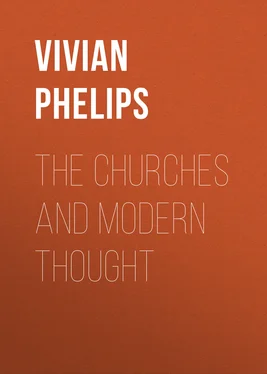Vivian Phelips - The Churches and Modern Thought
Здесь есть возможность читать онлайн «Vivian Phelips - The Churches and Modern Thought» — ознакомительный отрывок электронной книги совершенно бесплатно, а после прочтения отрывка купить полную версию. В некоторых случаях можно слушать аудио, скачать через торрент в формате fb2 и присутствует краткое содержание. Жанр: foreign_prose, foreign_religion, Философия, foreign_antique, на английском языке. Описание произведения, (предисловие) а так же отзывы посетителей доступны на портале библиотеки ЛибКат.
- Название:The Churches and Modern Thought
- Автор:
- Жанр:
- Год:неизвестен
- ISBN:нет данных
- Рейтинг книги:4 / 5. Голосов: 1
-
Избранное:Добавить в избранное
- Отзывы:
-
Ваша оценка:
- 80
- 1
- 2
- 3
- 4
- 5
The Churches and Modern Thought: краткое содержание, описание и аннотация
Предлагаем к чтению аннотацию, описание, краткое содержание или предисловие (зависит от того, что написал сам автор книги «The Churches and Modern Thought»). Если вы не нашли необходимую информацию о книге — напишите в комментариях, мы постараемся отыскать её.
The Churches and Modern Thought — читать онлайн ознакомительный отрывок
Ниже представлен текст книги, разбитый по страницам. Система сохранения места последней прочитанной страницы, позволяет с удобством читать онлайн бесплатно книгу «The Churches and Modern Thought», без необходимости каждый раз заново искать на чём Вы остановились. Поставьте закладку, и сможете в любой момент перейти на страницу, на которой закончили чтение.
Интервал:
Закладка:
Those who believe in the fact of the Resurrection, and have not Canon Henson’s reverent agnosticism concerning the event, must believe also in all the facts related in connection with it, including the account of Jesus having eaten and having been touched, and of his bodily ascent up into the clouds. If any one portion of the story be considered incredible or untrustworthy, the whole collapses. It may be useful, therefore, to put to ourselves some questions concerning any one of the many marvellous accessories of the Resurrection. How few of us have ever had our belief tested by searching questions such as a cultured heathen would put if we tried to convert him? For instance, what would you reply if you were asked by an intelligent native of India, China, or Japan: “Who were the saints of whom Matthew speaks as having risen from their graves? To whom did they appear? And how was it that their graves were opened as Jesus died, while their bodies did not come out till after His Resurrection? What also became of them afterwards?” To this the only candid reply possible would be: “I am unable to give you any information on this subject. Their not appearing till after Jesus rose from death would seem to have been introduced so as not to give them the precedence over Him in the exercise of the privilege of resurrection. He is said to be ‘the first that should rise from the dead’ (Acts xxvi. 23), ‘the first fruits of them that slept’ (1 Cor. xv. 20), ‘the first-born from the dead’ (Col. i. 18).” This, however, would hardly satisfy your questioner, who would reply: “Your inability to give me this information excites my suspicions, and your further statements seem to me to be very clumsy. To mark and enhance the death of the Messiah, nature is said to be convulsed, and graves thrown open; but the exit of the saints who were to come out of them is restrained till He should first have made His egress from the tomb three days later. And, after all, He had no such precedence in resurrection, for several persons are said to have been raised from the dead by the prophets of old and by Himself; two passed into heaven without ever being in their graves, and one of them—namely, Elias—appeared to Him with Moses in risen life at the time of His transfiguration. May I ask, Are the disturbances of nature which are said to have occurred at the crucifixion—namely, the preternatural darkness for three hours and the earthquake—mentioned by historians of the time?” You would have to confess, “They are not.” Thus you would fail to convert your heathen interlocutor, whose final fling at you would be: “That seems to demonstrate that nothing of the kind could really have occurred. Moreover, had there been such phenomena, the other evangelists would not have failed to support their position with these divine manifestations.”
If apologetics dealing with the Resurrection are unconvincing, still more so are those regarding the Ascension. There is little or no attempt to explain the meagreness of the Gospel narratives, how all mention of it is omitted in the Gospels of St. Matthew and St. John; and one vague sentence is all we are given in St. Mark and St. Luke—sentences which, according to the Higher Critics, were never penned by these persons. In “The Acts” the “St. Luke” writer furnishes the detail that “a cloud received him out of their sight,” and that, “as He went up, behold, two men stood by them in white apparel, which also said, Ye men of Galilee, why stand ye gazing up into heaven? This same Jesus, which is taken up from you into heaven, shall so come in like manner as ye have seen Him go into heaven.” In these days “ascending up” has no meaning for us. Candidly, if the writer had had our astronomical knowledge, would these words ever have been written? Certainly they would not. Then is the Ascension a fact or is it not? How is it possible that St. Matthew and St. John could have remained silent regarding such an event if they had really witnessed it? Or granting, in the case of the writer of “St. John,” that he was not St. John the Apostle, though he distinctly says he was, it is still astounding that he should have omitted to record such important evidence of Christ’s divinity, if it was an accepted fact at the time he wrote.
Archdeacon Wilson, in a paper read at the Diocesan Conference at Manchester, October 22nd, 1903, asks: “What do we mean in our Creed when we say: ‘He came down from heaven’? We explain away ‘down,’ we explain away ‘heaven’ in the sense in which the word was originally used. What do we mean by ‘descended into Hell’? by ‘Sitteth on the right hand of God’?… Spiritual truths are spiritually discerned, and do not admit of final intellectual definitions. We can only avert the rejection of theology by recognising its limitations.” Is it possible for the bulk of humanity, I ask, to possess the requisite spiritual discernment? Is it not far more likely that, with the spread of education, they will finally reject theology?
The Rev. David Smith, in his book, The Days of His Flesh , 48 48 Hodder & Stoughton, 1906.
dismisses the Ascension with the words: “When Jesus parted from the eleven on Olivet, He did not forsake the earth and migrate to a distant Heaven. He ceased to manifest Himself; but He is here at this hour no otherwise than during those forty days.” One can but wonder how Ascension Day is kept in Mr. Smith’s church, and how he brings himself to repeat the Apostles’ Creed.
Leaving aside the thoroughly unreliable nature of the Bible accounts of the Ascension, consider how easy it is for the superstitious, through optical illusions or subjective visions (or whatever name it may please the neologist to give to these “experiences”), to be honestly convinced of the occurrence of a supernatural event, and to take care that it should lose nothing of its marvellous character in the telling. Only the other day the good people of Sudja saw a mighty iris-coloured cross appear over the cathedral during divine service, and regarded the phenomenon as a sign of heaven’s resolve to bestow victory upon Christian Russia. This “miracle” was witnessed by all the notabilities of the city, who forwarded a description to General Kuropatkin in a document duly attested with their signatures. For the stupendous and absurdly impossible miracle of the Ascension we have not even got a satisfactory description, much less an attested document. Is it not time that we should ask ourselves the plain question, Do we really believe that an extraordinary levitation occurred, and that Jesus Christ was seen to be rising in the air until some passing clouds concealed Him from view? If we do not so believe, why do we say we do when we repeat the Creed? Why do we pretend we do when we sit in church and listen to the account of the Ascension, and perhaps to a sermon on it? Why do we allow our friends to think that we do so believe? Why is Ascension Day one of our Holy Days? And, finally, why do we teach, or allow others to teach, our children what we know to be untrue? Surely these are serious questions to ask ourselves.
There remains the miracle of the Virgin-birth. That this is under dispute among Christian theologians is notorious, and the controversy has but served to show with ever-increasing clearness how untrustworthy is the evidence for this miracle. Christian Biblical experts inform us that it belongs to the latest strata of the New Testament tradition, and that no trace of the story can be found before 120 A.D. In other words, that it is an obvious interpolation in St. Matthew and St. Luke. Adolf Harnack, the learned Professor of Church History in the University of Berlin, is looked upon, even by the orthodox, as one of our greatest living Biblical scholars, and we learn from him that we must disregard the history of Jesus’ birth given in these two Gospels; for not only is it untrustworthy, but “the evangelists themselves never refer to it, nor make Jesus Himself refer to His antecedents. On the contrary, they tell us that Jesus’ mother and His brethren were completely surprised at His coming forward, and did not know what to make of it. Paul, too, is silent; so that we can be sure that the oldest tradition knew nothing of any stories of Jesus’ birth.” 49 49 See p. 31 of What is Christianity? (Williams & Norgate, 1904).
Интервал:
Закладка:
Похожие книги на «The Churches and Modern Thought»
Представляем Вашему вниманию похожие книги на «The Churches and Modern Thought» списком для выбора. Мы отобрали схожую по названию и смыслу литературу в надежде предоставить читателям больше вариантов отыскать новые, интересные, ещё непрочитанные произведения.
Обсуждение, отзывы о книге «The Churches and Modern Thought» и просто собственные мнения читателей. Оставьте ваши комментарии, напишите, что Вы думаете о произведении, его смысле или главных героях. Укажите что конкретно понравилось, а что нет, и почему Вы так считаете.












